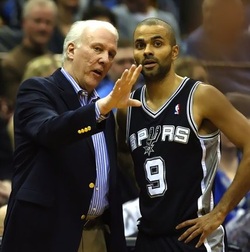
Jack McCallum’s article, “Pop Art”, is great reading for NBA sports fans but also leaders and those who want to learn more about leadership. Much has been written about Pop’s intellectually curiosity, embrace of diversity, sophistication, and people skills. He loves fine wines. He reads great books. And he encourages others to read great books. Reading is one key to developing as a leader.
Others (e.g., Baldoni, Eggers via Joey Burton) have commented on leadership lessons from Gregg Popovich. In the SI article, Pop talks about the importance of relationships, of having fun, but here I focus on his SI comments about discipline:
Popovich: “The only reason the word military is used to describe what goes on around here is because I went to the Academy [United States Air Force Academy near Colorado Springs, Colorado]. But the correct word is discipline. And there are disciplined people in Google, in IBM, and the McDonald’s down the street. Yes, we are disciplined with what we do.”
Discipline is not a word we see often these days in leadership/management/business books and periodicals. Yet, I think Popovich is correct. Perhaps it is too easy to associate discipline with automatons, mindless obedience to regimented procedures.
Henri Fayol, the great French industrialist, was first to describe the functions of management (planning, organizing, directing, controlling, coordinating). He also detailed 14 management principles, one being Discipline.
Fayol: “General opinion is deeply convinced that discipline is absolutely essential for the smooth running of business and that without discipline no enterprise could prosper . . . Discipline, being the outcome of different varying agreements, naturally appears under the most diverse forms; obligations of obedience, application, energy, behavior, vary, in effect, from one firm to another, from one group of employees to another, from one time to another.”
We live in different times but these words still have meaning. “Obligations to obedience” – know the plan, stick to the plan, do your part. “Application” – “Do or do not, there is no try” (Yoda, Jedi Master, nailed that one). “Energy” – Manage your effort, sustain so that you have endurance, take care of yourself (exercise, etc.). “Behavior” – Know your role, your position, be professional.
When Steve Kerr was pulled out of Spurs’ player rotation, he sat on the floor and not the bench. Kerr told SI that Pop pulled him aside and said, “Your body language is terrible. I know you’re not playing, but you’re a pro who’s always handled himself well, and now you’re not. It doesn’t look right, and I need you on the bench.” Kerr understood, knew Pop was right, and returned to the bench.
Fayol understood the relationship between leaders and discipline. He wrote, “The state of discipline of any group of people depends essentially on the worthiness of its leaders. . . discipline is what leaders make it.” My guess is that if Henri Fayol were alive today, he and Gregg Popovich could have a very interesting conversation – and would enjoy a great French wine.
Fayol, H. (1949). General and industrial management (C. Storrs, Trans.). London: Pitman. (Original work published 1916)
McCallum, J. (2013, April 29). Pop art. Sports Illustrated, 118 (18), 60-67.
Image of Gregg Popovich and Tony Parker by Tagio Hammil. http://www.flickr.com/photos/24121734@N05/5430678290/
Permission: http://creativecommons.org/licenses/by-nc-sa/2.0/deed.en
 RSS Feed
RSS Feed